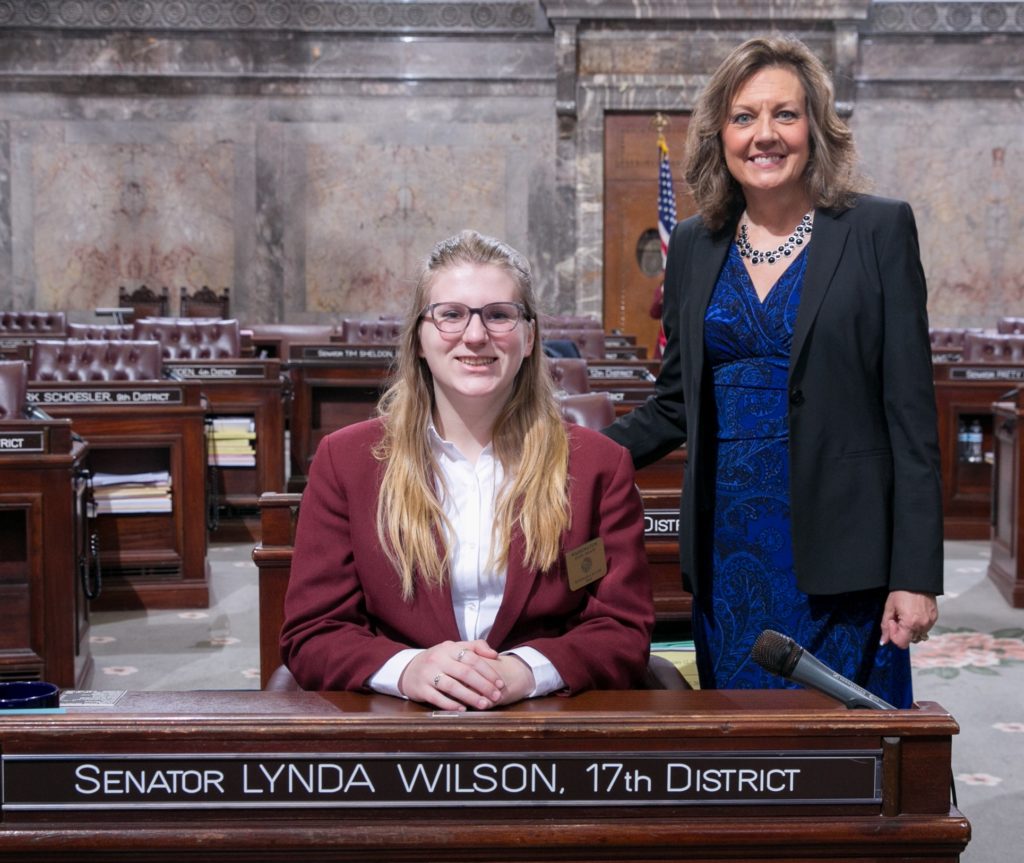Dear Friends and Neighbors,
Today we reached another important milestone in the 2018 session – the final day for action on bills from the “opposite house.” That means we have finished voting on bills passed by the House of Representatives, and the House is through voting on Senate bills for the year. The bills that received approval from both houses of the Legislature are delivered to the governor for his consideration. One of those is mine – Senate Bill 5213.
There is still much work to do during the six days left in the session. The Senate and House need to agree on final versions of the three supplemental budgets, and the policy bills associated with them. This also is the time when differences between versions of bills are settled. Because some of the biggest decisions have to do with the budgets, or disputes between the two chambers, the closing days can really serve to define a session.
Do Democrats want to improve security at all schools, or just some?
Last week Senate and House Democrats introduced identical bills titled “Improving security in schools and the safety of students.” Senate Bill 6620 and its House counterpart caught my attention for two reasons, and one has to do with a bill I introduced: Senate Bill 6119. It, too, is about improving security in schools and the safety of students – students at our community and technical colleges.

Not only is the public welcome to come and watch the Senate in action, from the public galleries overlooking the Senate chamber, but every so often we are in a position to pause and greet our visitors.
The worst mass shooting in Oregon history left 10 dead at a school – not a grade school or high school, but Umpqua Community College, in 2015. In our state, CTCs have been forgotten when it comes to campus security. Our four-year universities can have their own police forces, and our K-12 schools can have school resource officers from the local police department, but because CTCs are not allowed to maintain a law enforcement presence on their campuses, security means dialing 9-1-1. Had I known a year ago that CTCs can’t have their own security I would have introduced this measure then, and as chair of the higher education committee I could have moved it forward. This year, the new committee chair did not allow it to move an inch, even though his own vice chair is among the three Democrats who joined me and two other Republicans to sponsor the bill. My Democrat colleagues clearly want more security for K-12 schools, so why discriminate against CTCs? They are public schools too, and teenagers are on those campuses like never before because of Running Start programs.
But back to SB 6620, the Democrats’ new “student safety” bill. Parts 1 through 5 fit within the title, addressing things like emergency response systems, but Part 6 (more than half of the bill) caught my attention because it is a flat-out ban on purchases or transfers of semiautomatic rifles by people younger than 21. I realize that firearms are a common denominator in school shootings, but they don’t fire by themselves. Putting an age restriction on firearms purchases in the name of “student safety” is a big leap.
If the new Senate majority brings its “student safety” proposal to a vote, I plan to offer the language in SB 6119 as an amendment. Then we might find out how concerned my Democrat colleagues are about the safety of students at Clark College or any other CTC, who are as vulnerable as any high-school or grade-school student.
My bill to support domestic-violence victims heads to governor
Last year I introduced legislation to fix an issue affecting the legal practitioners known as limited license legal technicians. The work of LLLTs is limited in Washington to family-law matters, with an emphasis on assisting with domestic-violence protection orders. They are not attorneys, so their services can be more affordable for domestic-violence victims who need help.
The concern came to me from an LLLT who has been in practice longer than most (in our state, the field is only a few years old) and was having difficulty receiving payment for services rendered. I realized a change in the law was needed if our state is to keep this affordable legal support option available to serve more domestic-violence victims. Under my Senate Bill 5213, a court can order the respondent in a civil matter to pay attorney’s fees, and my bill allows the same for the fees incurred by an LLLT.
SB 5213 won unanimous support in the Senate earlier this month and overwhelming support from the House of Representatives Wednesday. It goes to the governor next, and I am confident it will receive his signature.
Two Wilson bills win Senate approval only to stall in House
I am pleased to see SB 5213 complete its journey through the Legislature but disappointed that another of my bills in support of domestic-violence victims has stalled, along with legislation that would help veterans.
Senate Bill 6292 would allow domestic-violence victims to receive real-time notification when their perpetrators are nearby, so they have time to leave or prepare for a possible confrontation. The bill was advanced by our Senate Law and Justice Committee, then passed unanimously by the full Senate earlier this month. For some reason the bill took a different route in the House; after clearing the House committee on public safety, it was diverted to the House budget committee. There it sits.

It was my privilege to sponsor Hannah Callan of Vancouver as a Senate page this week. Hannah is the 16-year-old daughter of John and Julie Callan, and a junior at Mountain View High School. This was a busy week to be a page because we spent so many hours working in the Senate chamber, and I know Hannah did a great job!
Also, it is particularly hard to see my Mental Health for Heroes legislation (Senate Bill 5525) go a similar route for a second year. About 5,000 veterans are enrolled in our state’s four-year universities, and as the daughter of a 20-year Air Force veteran I realize that veterans transitioning into civilian/student life can face unique issues stemming from their service. My bill would require the public four-year institutions to employ at least one full-time mental health counselor with specific experience working with veterans, active military personnel, or their families.
Last year the Senate passed my bill 47-0, but SB 5525 did not move forward from the House budget committee. The same thing has happened this year: another unanimous Senate vote, only for the bill to get stuck in the House budget committee. It’s a mystery why the Democrat majority in the Senate gave full support to these bills, yet the Democrat majority in the House is opposed to my proposals to help veterans, and victims of domestic violence.
Yours in service,












